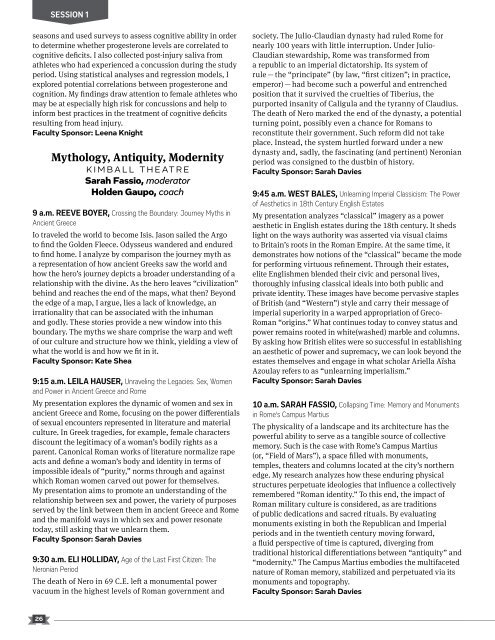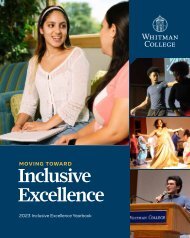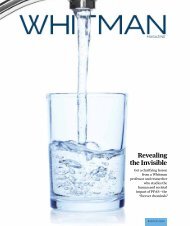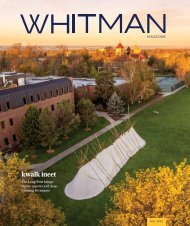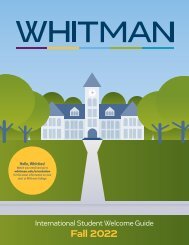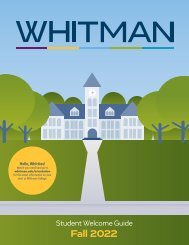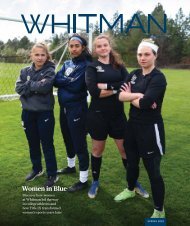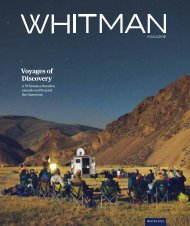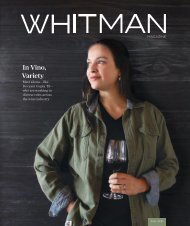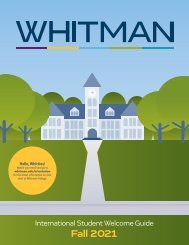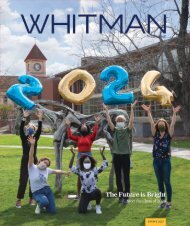Whitman College Undergraduate Conference Program 2020
Whitman College 2020 Undergraduate Conference Program
Whitman College 2020 Undergraduate Conference Program
You also want an ePaper? Increase the reach of your titles
YUMPU automatically turns print PDFs into web optimized ePapers that Google loves.
SESSION 1<br />
seasons and used surveys to assess cognitive ability in order<br />
to determine whether progesterone levels are correlated to<br />
cognitive deficits. I also collected post-injury saliva from<br />
athletes who had experienced a concussion during the study<br />
period. Using statistical analyses and regression models, I<br />
explored potential correlations between progesterone and<br />
cognition. My findings draw attention to female athletes who<br />
may be at especially high risk for concussions and help to<br />
inform best practices in the treatment of cognitive deficits<br />
resulting from head injury.<br />
Faculty Sponsor: Leena Knight<br />
Mythology, Antiquity, Modernity<br />
KIMBALL THEATRE<br />
Sarah Fassio, moderator<br />
Holden Gaupo, coach<br />
9 a.m. REEVE BOYER, Crossing the Boundary: Journey Myths in<br />
Ancient Greece<br />
Io traveled the world to become Isis. Jason sailed the Argo<br />
to find the Golden Fleece. Odysseus wandered and endured<br />
to find home. I analyze by comparison the journey myth as<br />
a representation of how ancient Greeks saw the world and<br />
how the hero’s journey depicts a broader understanding of a<br />
relationship with the divine. As the hero leaves “civilization”<br />
behind and reaches the end of the maps, what then? Beyond<br />
the edge of a map, I argue, lies a lack of knowledge, an<br />
irrationality that can be associated with the inhuman<br />
and godly. These stories provide a new window into this<br />
boundary. The myths we share comprise the warp and weft<br />
of our culture and structure how we think, yielding a view of<br />
what the world is and how we fit in it.<br />
Faculty Sponsor: Kate Shea<br />
9:15 a.m. LEILA HAUSER, Unraveling the Legacies: Sex, Women<br />
and Power in Ancient Greece and Rome<br />
My presentation explores the dynamic of women and sex in<br />
ancient Greece and Rome, focusing on the power differentials<br />
of sexual encounters represented in literature and material<br />
culture. In Greek tragedies, for example, female characters<br />
discount the legitimacy of a woman’s bodily rights as a<br />
parent. Canonical Roman works of literature normalize rape<br />
acts and define a woman’s body and identity in terms of<br />
impossible ideals of “purity,” norms through and against<br />
which Roman women carved out power for themselves.<br />
My presentation aims to promote an understanding of the<br />
relationship between sex and power, the variety of purposes<br />
served by the link between them in ancient Greece and Rome<br />
and the manifold ways in which sex and power resonate<br />
today, still asking that we unlearn them.<br />
Faculty Sponsor: Sarah Davies<br />
9:30 a.m. ELI HOLLIDAY, Age of the Last First Citizen: The<br />
Neronian Period<br />
The death of Nero in 69 C.E. left a monumental power<br />
vacuum in the highest levels of Roman government and<br />
society. The Julio-Claudian dynasty had ruled Rome for<br />
nearly 100 years with little interruption. Under Julio-<br />
Claudian stewardship, Rome was transformed from<br />
a republic to an imperial dictatorship. Its system of<br />
rule — the “principate” (by law, “first citizen”; in practice,<br />
emperor) — had become such a powerful and entrenched<br />
position that it survived the cruelties of Tiberius, the<br />
purported insanity of Caligula and the tyranny of Claudius.<br />
The death of Nero marked the end of the dynasty, a potential<br />
turning point, possibly even a chance for Romans to<br />
reconstitute their government. Such reform did not take<br />
place. Instead, the system hurtled forward under a new<br />
dynasty and, sadly, the fascinating (and pertinent) Neronian<br />
period was consigned to the dustbin of history.<br />
Faculty Sponsor: Sarah Davies<br />
9:45 a.m. WEST BALES, Unlearning Imperial Classicism: The Power<br />
of Aesthetics in 18th Century English Estates<br />
My presentation analyzes “classical” imagery as a power<br />
aesthetic in English estates during the 18th century. It sheds<br />
light on the ways authority was asserted via visual claims<br />
to Britain’s roots in the Roman Empire. At the same time, it<br />
demonstrates how notions of the “classical” became the mode<br />
for performing virtuous refinement. Through their estates,<br />
elite Englishmen blended their civic and personal lives,<br />
thoroughly infusing classical ideals into both public and<br />
private identity. These images have become pervasive staples<br />
of British (and “Western”) style and carry their message of<br />
imperial superiority in a warped appropriation of Greco-<br />
Roman “origins.” What continues today to convey status and<br />
power remains rooted in white(washed) marble and columns.<br />
By asking how British elites were so successful in establishing<br />
an aesthetic of power and supremacy, we can look beyond the<br />
estates themselves and engage in what scholar Ariella Aïsha<br />
Azoulay refers to as “unlearning imperialism.”<br />
Faculty Sponsor: Sarah Davies<br />
10 a.m. SARAH FASSIO, Collapsing Time: Memory and Monuments<br />
in Rome’s Campus Martius<br />
The physicality of a landscape and its architecture has the<br />
powerful ability to serve as a tangible source of collective<br />
memory. Such is the case with Rome’s Campus Martius<br />
(or, “Field of Mars”), a space filled with monuments,<br />
temples, theaters and columns located at the city’s northern<br />
edge. My research analyzes how these enduring physical<br />
structures perpetuate ideologies that influence a collectively<br />
remembered “Roman identity.” To this end, the impact of<br />
Roman military culture is considered, as are traditions<br />
of public dedications and sacred rituals. By evaluating<br />
monuments existing in both the Republican and Imperial<br />
periods and in the twentieth century moving forward,<br />
a fluid perspective of time is captured, diverging from<br />
traditional historical differentiations between “antiquity” and<br />
“modernity.” The Campus Martius embodies the multifaceted<br />
nature of Roman memory, stabilized and perpetuated via its<br />
monuments and topography.<br />
Faculty Sponsor: Sarah Davies<br />
Life and The Mind<br />
REID G02<br />
Bryanna Schreiber, moderator<br />
Ellery Shore Nelson, coach<br />
9 a.m. MICHAEL MEHLMAN, ALLYSSA SULLIVAN,<br />
YUWEI LIU, Effects of Fluoxetine in Mitigating Depression in Socially<br />
Isolated Zebra Finches<br />
Depression, the leading cause of disability worldwide, is often<br />
associated with social isolation. To explore this relationship,<br />
we placed zebra finches (Taeniopygia guttata) in isolation.<br />
Like humans, zebra finches are gregarious. We examined how<br />
prolonged isolation influences levels of corticosterone, a stress<br />
hormone elevated during depression, as well as time spent<br />
singing and body weight. Birds were randomly selected to live<br />
either in a social colony or isolated cage. We examined how<br />
fluoxetine, a selective serotonin reuptake inhibitor (SSRI),<br />
potentially counters effects of isolation. SSRIs raise serotonin<br />
levels in the brain, decreasing depressive symptoms. We<br />
expected isolated birds to have higher corticosterone levels,<br />
fluctuating weight, spend less time singing in comparison<br />
with birds living in social settings and also that the<br />
administration of fluoxetine would reverse these effects. Our<br />
experiments provide insights into the development of mental<br />
illnesses in isolated individuals and explore the benefits<br />
of antidepressants.<br />
Faculty Sponsor: Nancy Day<br />
9:15 a.m. NIKKI DELGADO, LEAH MORTIMER, Effects of<br />
Maternal Stress on Fetal and Child Brain Development<br />
Research has shown that elevated maternal cortisol levels,<br />
as a result of a maternal history of childhood maltreatment<br />
or life stress, can negatively impact fetal brain development.<br />
Cortisol exerts its effects via the hypothalamic pituitary<br />
adrenal (HPA) axis, which controls stress on the human<br />
body. The adverse functioning of the HPA axis can lead to<br />
many negative physical, emotional and social consequences<br />
for the developing child. Furthermore, a history of maternal<br />
childhood maltreatment can potentially affect perceived<br />
parental self-efficacy, which could negatively impact the<br />
development of neural systems in childhood, specifically<br />
due to poor parenting behavior. Our research examines the<br />
effects of elevated maternal cortisol levels on fetal HPA axis<br />
development, as well as how a maternal history of childhood<br />
maltreatment relates to perceived self-efficacy as a future<br />
parent. Thus, we hope to emphasize how maternal childhood<br />
maltreatment is a public health problem with various<br />
consequential repercussions for children.<br />
Faculty Sponsor: Lauren Berger<br />
9:30 a.m. SAMARAH URIBE MENDEZ, CAM SIPE,<br />
BECCA LINN, Does Classroom Diversity Matter? Racial/Ethnic Identity<br />
and School Belonging<br />
School belonging is a critical component of adolescent<br />
development that has been linked to positive outcomes.<br />
Classroom composition can impact feelings of belonging<br />
among students. Our research examines the relationship<br />
between classroom diversity, school belonging and an<br />
individual’s racial/ethnic identity. Students from three area<br />
high schools comprise our study. We hypothesize that greater<br />
diversity in the classroom helps students develop their racial/<br />
ethnic identity and that a more positive racial/ethnic identity<br />
leads to a greater sense of school belonging. Our study will<br />
provide greater understanding of the role that schools play in<br />
the well-being and academic success of ethnic/racial minority<br />
students. Our findings may better inform the decisions made<br />
in American classrooms as they grow more diverse.<br />
Faculty Sponsor: Stephen Michael<br />
9:45 a.m. BELLA BLANCO, Role of Facial and Contextual Cues on<br />
Racial and Ethnic Categorization of Mixed-Race Individuals<br />
The mixed-race population is the fastest-growing racial<br />
group in the United States, but our understanding of how<br />
multiracials are perceived by others is limited. Previous<br />
research on racial categorization has focused on the dynamic<br />
interactive theory (model) of person construal, which suggests<br />
that perceptions of others involve interactions between lowlevel<br />
processing of facial, vocal and body cues and high-level<br />
cognitive states (social categories and stereotypes). I examine<br />
how the theory applies to categorizing mixed-race individuals.<br />
While the general process of racial categorization works quickly<br />
with monoracial faces, categorizing mixed-race faces may be<br />
more difficult due to lack of exposure to mixed-race people<br />
and the incompatibility of ambiguous faces with pre-existing<br />
racial schemas. I examine whether facial cues or contextual<br />
cues are more predictive of racial categorization of monoracial<br />
and mixed-race individuals. My study also considers how<br />
familiarity with certain ethnic minority populations may<br />
influence accuracy and confidence of categorization.<br />
Faculty Sponsor: Lauren Berger<br />
10 a.m. BRYANNA SCHREIBER, JESSIE MANO, The Effect<br />
of Mental Toughness and Mood on Perseverance in Athletes and<br />
Non-Athletes<br />
Mental toughness is the psychological edge that enables<br />
people to better handle adverse situations and remain<br />
focused and in control under pressure. Research suggests<br />
that athletes who possess high levels of mental toughness<br />
exhibit more perseverance through adversity, potentially<br />
due to their ability to effectively regulate emotions in<br />
challenging situations. Our presentation is based on<br />
a study examining how mental toughness influences<br />
perseverance on a difficult task in a non-athletic setting<br />
when participants are exposed to images that induce<br />
a positive, neutral or negative mood. We measure<br />
participants’ mood and mental toughness, then present<br />
images to induce the mood, examine their perseverance<br />
with a task and then measure mood and demographics.<br />
We expect those with higher mental toughness levels<br />
to persevere longer than those with lower levels,<br />
especially when in a negative mood. Our research will<br />
add to the literature by aiding in the conceptualization of<br />
mental toughness.<br />
Faculty Sponsor: Stephen Michael<br />
26 27


